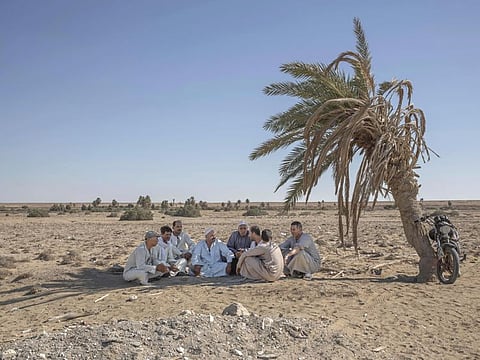Water conflicts are Middle East’s next flash points
We need a global initiative aimed at downstream countries’ rights to full water rights

In the midst of Inter-Regional conflicts and intra-state civil strife, an ancient form of geopolitical confrontation is taking centre stage; water wars.
A few non-Arab regional powers are flexing their muscles and moving to fill the vacuum left by the implosion of central governments and the general malaise afflicting the so-called Arab Order.
These powers are Iran, Turkey and Ethiopia. Despite their conflicting agendas they share at least one thing; an avarice for water/hydroelectric resources at the expense of their Arab neighbours.
What is needed, to avoid military confrontations, is a global initiative aiming at emboldening international treaties that would enshrine downstream countries’ rights to full water rights. The alternative could prove catastrophic for the entire regionOsama Al Sharif
Nowhere in the region than Iraq can this be the case. The ancient cradle of civilisation is dependent on the free flow of the two great rivers; the Tigris and Euphrates.
With many regional tributaries, the two rivers had sustained life, culture and great empires for millennia. But now an embattled and weakened Iraq is facing an existential challenge.
Iran and Turkey, the source of a number of tributaries that feed its two great rivers, have been building dams and diverting rivers that are starving Iraq of water needed for drinking, irrigation and sustenance.
Also Read: A dramatic turn of events in Libya
Also Read: Need for a new Arab awakening
Also Read: Egypt’s fatwa bill objected by Al Azhar
Most recently Iraq has accused Iran of illegally diverting the waters flowing from Great Zap and Sirwan rivers to feed its own reservoirs.
Iraq said that it had noted a steep drop in the flow of waters from those two rivers that feed the Diyala River in Iraq; affecting the province of Diyala and the entire Kirkuk irrigation system.
Where the Lower Zap River flow is concerned the drop is so critical that it affects the water levels in the Tigris River. The Iranian measures will also affect water reserves behind two main Iraqi dams.
From Tigris to Euphrates
Adding to Iraq’s many qualms is the fact that Turkey too has unilaterally turned on a number of water and hydroelectric projects that have affected the flow of both the Tigris and Euphrates into Iraq.
Since Turkey started filling the lake behind the Ilisu Dam, on the Tigris River last year, a decades-old project that is expected to generate 1200 megawatts of electricity for southeast Turkey, the water level in Mosul Dam had dropped by three billion cubic meters in recent months.
Over the years Turkey has built 22 dams and 19 hydropower plants through its Southeast Anatolia Project (GAP), with blatant disregard of the effect of these projects on Iraq which is a downstream country.
The drop in the water levels of the two great rivers is already creating sanitary, environmental and economic crises in struggling Iraq; Basra being a case in point.
Extraordinary existential challenge
Apart from Iran and Turkey, Egypt and Sudan are facing an extraordinary existential challenge as Ethiopia continues to ignore calls to reach an agreement on a timetable to fill the lake behind the Great Renaissance Dam that would safeguard the interests of the downstream countries.
Ethiopia has begun the process of filling the dam; one that would take a few years but the government has ignored calls to agree to a timetable that would not affect the free flow of the Blue Nile into Sudan and Egypt.
It goes without saying that neither country can afford an acute drop in the normal discharge of the river especially during drought seasons.
For Egypt the issue is one of survival as it depends on the Nile for all its drinking, irrigation and a good measure of its hydroelectric supply.
For Syria, Iraq and Egypt water conflicts are becoming a real threat. Turkey is using water as a weapon against the people of Hasaka in Syria. For Iraq and Egypt the challenge is existential more so than ever before. It is now part of a larger geopolitical face off as most of the Middle East/Arab World emerges as one of the world’s most water starved regions.
What is needed, to avoid military confrontations, is a global initiative aiming at emboldening international treaties that would enshrine downstream countries’ rights to full water rights. The alternative could prove catastrophic for the entire region.
Osama Al Sharif is a journalist and political commentator based in Amman.








